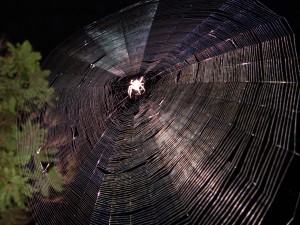As a child I used to bug adults with silly jokes, and I still remember several about spiders (when something makes them mad, it drives them up the wall, etc.). There have always been jokes about spiders, presumably because they are among nature’s most fascinating creatures, interesting and beautiful to some people, scary to many others. In recent years the jokes have a decidedly modern flair (How do spiders communicate? Through the worldwide web.)
 There is nothing funny, however – or even mildly amusing – about the impact of a small spider called a Bone Cave Harvestman on a decorated veteran and his family in Texas. This is a salt-of-the-Earth family, as described by my friend Brian Seasholes of Reason in a Daily Caller op-ed last month:
There is nothing funny, however – or even mildly amusing – about the impact of a small spider called a Bone Cave Harvestman on a decorated veteran and his family in Texas. This is a salt-of-the-Earth family, as described by my friend Brian Seasholes of Reason in a Daily Caller op-ed last month:
“John Yearwood owns 856 acres in Williamson County, Texas that has been in his family for 145 years, on which he runs cattle. John is a proud landowner and American; he is a decorated Army veteran who earned a Purple Heart for being wounded in the Vietnam War, is a deeply committed steward of his land who has undertaken erosion control projects and reseeded with native grasses, and he and his wife take great pride contributing to the community. She teaches Sunday school, was a president of the local PTA, and she and John let 4-H and church groups use the property, free of charge, for camping and to practicing shooting sports and archery on the range they constructed at their own expense. Also, Army soldiers on leave use the property to hone their outdoor skills.”
The Yearwood family planned to expand the use of their property by youth groups and soldiers, because they enjoy the interaction and believe it in helping their community. But there is a big problem. Part of their ranch includes three sites the government says are also habitat for the Bone Cave Harvestman, a tiny spider listed as endangered under the Endangered Species Act. There is no way to put a “positive spin” on that – it means human impacts on the habitat would be punishable by fines of up to $50,000 and/or a year in jail. That is a deal killer, because allowing camping in that portion of the Yearwood property would require clearing some brush (there are snakes there, too).
John Yearwood was apparently told he could mitigate that damage, but at a cost of well over $1 million. So much for that public-spirited plan. Other ranchers in the same area have resorted to getting rid of the spiders before anyone notices their presence, as is all too common in the way property owners everywhere have learned to treat endangered species habitat. That is counterproductive, of course, to the intent of the endangered listing itself. If we really care about this creature, shouldn’t we find ways to encourage its conservation? It is just one of thousands of examples across America of federal species activity that is demonstrably bad for the species.
Professional “spin doctors” in the government, and in some environmental organizations, are constantly trying to explain why this federal punitive approach is the only way to conserve our air, water, and wildlife. That’s because they believe people cannot be trusted to care about their own back yards. They couldn’t be more wrong.
In fact, the most successful species conservation efforts in America have been carried out not by federal regulators, but by state and local governments, private landowners, and private non-profit land trusts. The Gunnison Sage Grouse is a classic example of the preservation of thousands of acres of habitat through such partnerships. That success, and dozens of others like it, are seriously threatened by federal punitive actions that put a damper on landowners’ willingness to participate.
There are 40,000 known species of spiders, and that diversity is part of what has always fascinated people about nature. We care about all of them, and should never purposely eradicate entire species. But where is the balance between one rocky sagebrush-covered hillside with a few snakes and spiders, and the enjoyment of landowners and their communities?
Sir Walter Scott wrote (Marmion, 1808), “Oh, what a tangled web we weave, when first we practice to deceive!” True conservation, even for spiders, begins with honesty about the goals. The result of our current approach to species conservation has essentially turned part of the Yearwood Ranch into a national wildlife refuge that didn’t cost the government a nickel. That has nothing to do with spiders, and everything to do with federal control over private land.
This column originally appeared in the Grand Junction Daily Sentinel January 27, 2017.




Comments on this entry are closed.